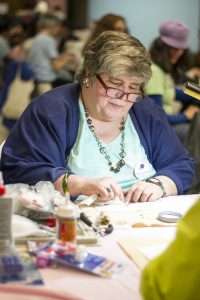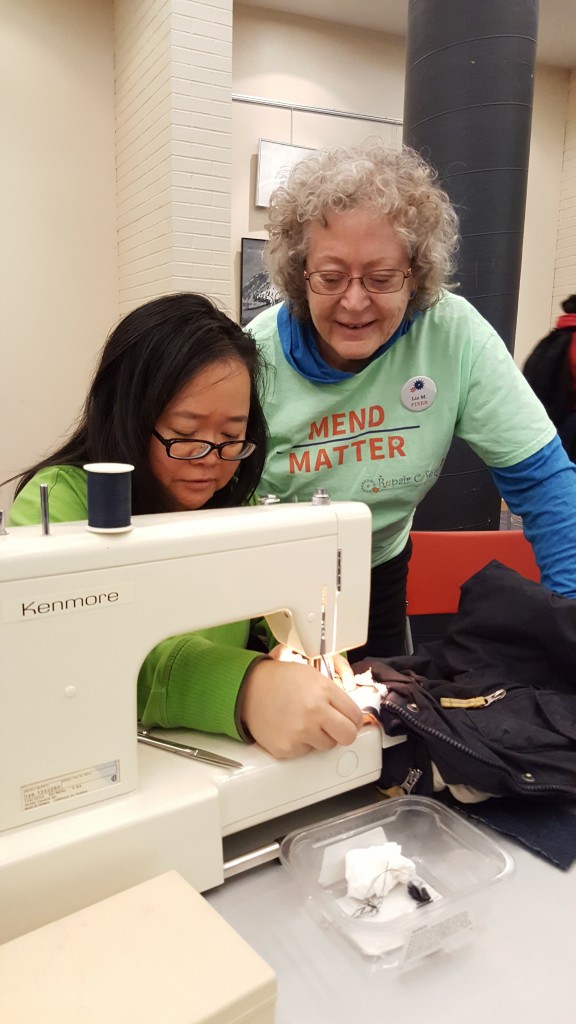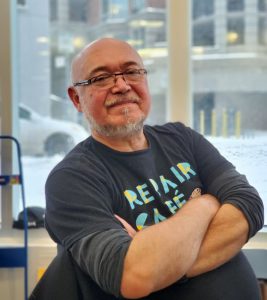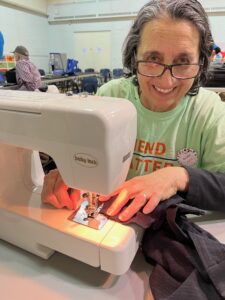Repair Café is supported by our volunteer Fixers who enjoy repairing household items while helping visitors learn the how-to. Our Fixer team has been growing steadily since our launch in 2013. Some of them are professionals while many others are hobbyists. They have diverse backgrounds and each of them has a unique story. Through their profiles, you will learn a little bit about their backgrounds, their volunteering experiences as well as their thoughts about the Repair Café. Below are the first seven profiles. Enjoy.
- Katherine
 What items do you fix?
What items do you fix?
I fix computers mainly, but I also fix mobile devices sometimes as well.Day Job
I’m a high school student.When did you first start with working with Repair Café Toronto?
I first started volunteering with the organization in November of 2016.Quote
Your work is going to fill a large part of your life, and the only way to be truly satisfied is to do what you believe is great work. And the only way to do great work is to love what you do. If you haven’t found it yet, keep looking. Don’t settle. As with all matters of the heart, you’ll know when you find it.
-Steve JobsHow did you learn your skills?
I learned them mostly through my own research and I took one class on computer building.What is your favourite location?
I don’t have a favourite location yet.Why/when did you become interested in repairing things?
I became interested in repairing things when I built my own computer in 2013 and helped a friend do the same. I became interested in repairing things because I liked to help others when I could and repairing computers was a way for me to help people.What does it mean to you to volunteer at the Repair Café Toronto?
It’s another opportunity to help people to the best of my ability. Before I started volunteering at Repair Café, friends would ask me for help sometimes, but I wanted to help more people. I enjoyed seeing how happy people were when I could fix something for them and I could learn and develop my experience from fixing different problems.What is the most memorable item you have repaired?
I don’t have a particularly memorable item yet.Why should people get involved with the Repair Café?
I think people should get involved because it’s a great cause. Both volunteers and participants can share their skills and help each other while getting items repaired for a much lower cost than at a professional repair shop.Where do you see the Repair Café Toronto in five years?
I hope to see it expand into a larger organization with more volunteers and participants, as well as with multiple events across the city each month instead of just one major event each month. - Faith
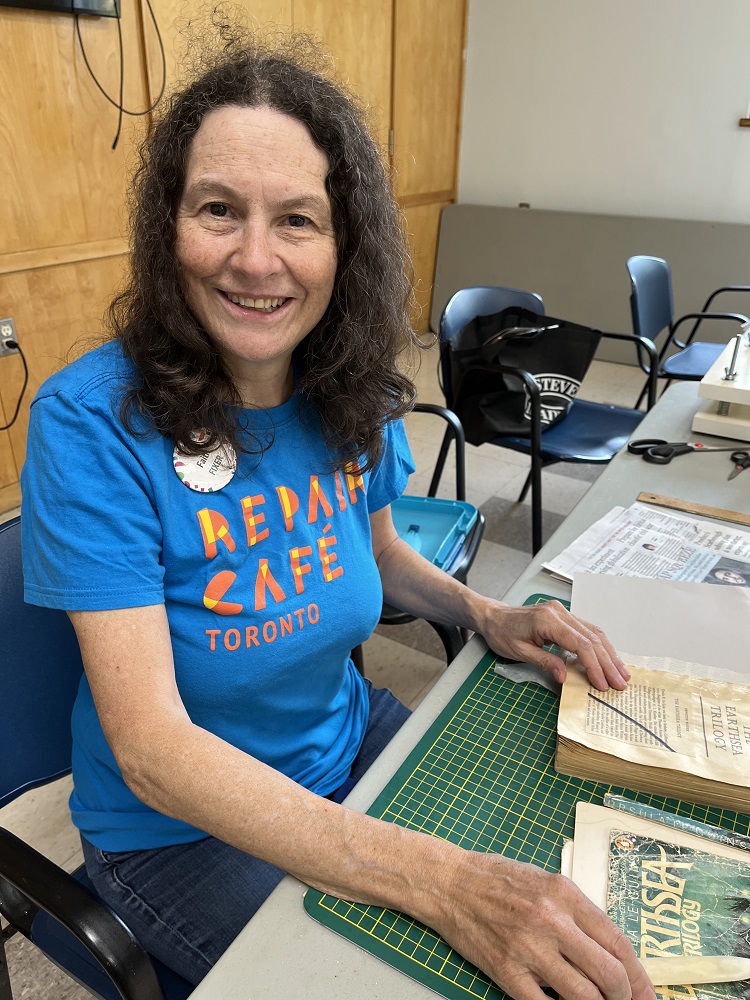 What kind of items do you fix?
What kind of items do you fix?
I repair books.When did you first start volunteering with Repair Café Toronto?
November 2014What is your day job?
Professor of Computer Science at UofT.What is your favourite location?
The Toronto Reference Library, because it is bright and spacious and it is easy to get to via TTC.Do you have a favourite quote?
“You are not obligated to complete the task [of making the world a better place], but neither are you free to desist from it.” (Pirke Avot 2:21).Why did you start getting interested in repairing things?
I don’t like wasting things. Also, repairing things helps me understand how they work.How did you learn your skills?
I learned how to do book repair at Repair Café, working as an assistant to Andy.What does it mean to you to volunteer at Repair Café Toronto?
Working at Repair Café lets me to help make our city a better place to live.What is the most memorable item you have fixed?
I particularly like repairing books that children bring in.Why should people get involved with Repair Café Toronto?
It’s fun to work with other people and learn from them.Where do you see Repair Café Toronto in five years?
Even better than before the pandemic. Repair Café will be well known throughout Toronto. - Bennett
What kind of items do you fix?
Jewellery and sometimes eyeglasses and watches. Miscellaneous jobs like gluing china or small jobs with metal.
When did you first start volunteering with Repair Café Toronto?
November 2014
Day Job
Retired Ontario civil servant – Government accountability and risk management
Favourite Location
Toronto Reference Library. It is big, has lots of light and lots of space for people to sit. It also has a Balzac’s Coffee. I like all of the locations, the libraries especially. They have a lot of people flowing in and out.
Quote
When the great cellist Pablo Casals was 81, someone filming him asked why, at his age, he still practiced four to five hours a day. Casals answered: “Because I think I am making progress.”
Why did you start getting interested in repairing things?
I started making pieces of jewellery and learned enough by making complex pieces to know how (and whether) to fix them myself.
My Mother had broken items in her jewellery box. She would sigh and say “it’s broken” put it away and close the box. I liked the feeling of getting people wearing lovely things again, because jewellery is easy to break but very satisfying to fix.
Knowing what to do as well as what not to do is important. I was cautious but often enough I could do something to fix it. Once you’ve had a success like that people are very happy.
How did you learn your skills?
I learned from making jewellery. I learned lots about glue, I need to learn more about glue though, what to use, what not to use.
I am now taking silversmithing to understand more about metals.
What does it mean to you to volunteer at Repair Café Toronto?
The people who come into the Repair Café really want to wear the things they bring in. I get tons of hardware or “findings” as they call them. It feels so good to give it away and teach customers how to do it, so they can have the satisfaction of doing it themselves. At one point at the Reference library we had three customers working on their own stuff.
What is the most memorable item you have fixed?
A lady came in with 26 silver necklaces. She was small and nicely dressed with scarves up to her neck and a silk blouse. She asked me if I could fix her necklaces. I couldn’t see anything, but then she unwrapped her scarves. She had 26 silver necklaces on that looked like a thick garland. She told me she wore them for her health. Eight of them were broken in different ways and two of them needed a silversmith.
I was able to repair six on the spot; for the other two, I explained how to do the repairs and where to find a person. She walked out with most of the necklaces in good shape and 2 needing more work. I told her she really should polish the necklaces, as when silver gets very black you start losing metal. After I polished the necklaces for her she said, “I like the effect, it looks good.
Why should people get involved with Repair Café Toronto?
It’s important to put things to use. Jewellery gives people great pleasure. It’s not essential to life, but people love it and have a strong emotional attachment to it.
When jewellery is broken people feel unhappy every time they see it. Some of the repairs are quite simple.
Where you see Repair Café Toronto in five years?
I’d like to see more groups having Repair Cafés. If people knew in advance there was going to be a Repair Café more often and in their neighbourhood they’d be more likely to go. I’d like to see more people knowing and being taught how to do their own jewellery repairs.
- Sera
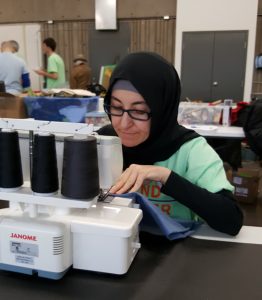
What kinds of items do you fix?
Many daily things and mainly clothing at Repair Café.When did you first start volunteering with Repair Café Toronto?
January 2017What is your day job?
Apparel Graphic DesignerWhy did you start to becoming interested in repairing things?
Since my childhood, as both my parents were quite resourceful in many ways.How did you learn your skills?
I learned almost all my sewing and crafting skills from my mom. She was a great tailor.What does it mean to you to volunteer at the Repair Café?
It is pleasant to be there, it is kind of a therapy. It is also is a great place to socialize with like-minded people who stand against wasting. I impatiently wait to join and fix things at Repair Café every month. It is wonderful to solve a problem on every piece. Exchanging my skills with the reward of happy faces is invaluable.What is the most memorable (or fun, or challenging) item you have fixed?
All items are fun to fix for me.Why should people get involved with the Repair Café?
As I said before, it is a great place to socialize with like-minded people and to help people. I also like the idea of regaining broken items instead of just throwing them away, supporting the economy and helping to sustain the ecosystem is wonderful. Whoever has any skills or enthusiasm for the values mentioned, should join us.Where do you see Repair Café Toronto in 5 years?
I believe it will spread more and benefit more people in the future. - Alan
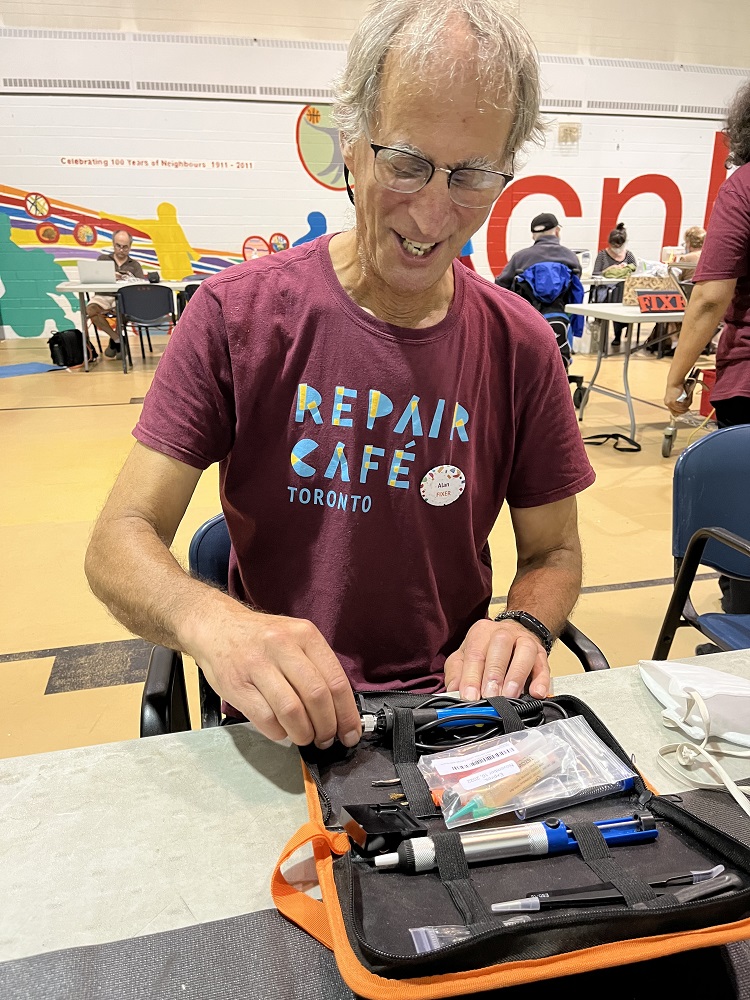 What kind of items do you fix?
What kind of items do you fix?
Mostly household and kitchen appliances, radios, vintage VCRs and CD players and any electrical or electronic device.When did you first start volunteering with Repair Café Toronto?
Maybe 5-6 years? Stupid pandemic put a hole in that.What is your day job?
I have been retired for 4.5 years. My last job was at UofT, Physics department, making equipment for the quantum mechanics research labs. Before that I was in telecom as an RF engineer.What is your favourite location?
If I had to chose, the Toronto Reference Library has the nicest venue. Places such as St. James Town are more accessible and the people are very appreciative of having any items repaired.Do you have a favourite quote?
“If it ain’t broke, don’t fix it. If it is broke, fix it.”
Although not repair related, I chuckle at “You are immortal until proven otherwise”. (anonymous)Why did you start getting interested in repairing things?
I have always been making things, from push carts as a kid to anything that interested me, to various degrees of capability.How did you learn your skills?
I went to what is now called Toronto Metropolitan University for electronics and never looked back. That was just past the tube era, overlapping with the first IBM and Apple computers. Part of the job was keeping up with the changes, each one based on previous changes. A lot of electronics is learning on the job.What does it mean to you to volunteer at Repair Café Toronto?
I enjoy doing a simple repair to something instead of having it being thrown out. That is reflected in the people bringing things in for repair, a very common comment. Many people can’t afford to just buy new stuff so we keep things running as long as possible.What is the most memorable item you have fixed?
Definitely was a Kitchen Aid stand mixer. The two ladies came prepared. They had downloaded the iFixIt.com video on how to dismantle the mixer, they printed the instructions, had a replacement gear for the expected broken part, and popsickle sticks. Once it was fully opened, they used the sticks to carefully remove every shred of of the broken gear from the large amount of grease. The new gear was put in, the grease was put back, the mixer was reassembled and it worked, thanks to their preparations.Why should people get involved with Repair Café Toronto?
Besides keeping things out of landfill and otherwise having to buy new items, there is a feeling of community, of helping.Where do you see Repair Café Toronto in five years?
I hope that Repair Café grows even bigger, that it becomes a well known event. Not enough people know about the Repair Café. There are many people who both would be fixers and would bring in items for repair if the Repair Café was as ubiquitous as libraries. Maybe Repair Café can be affiliated with TPL and have permanent or semi-permanent locations? - Liz
What kinds of items do you fix?
Mainly clothing repairs, as opposed to alterations, but have done some backpack fixes, umbrellas needing sewing repair, even shoes.When did you first start volunteering with Repair Café Toronto?
So long ago, I’ve forgotten!What is your day job?
Retired former Occupational Health and Safety Registered Nurse; now other volunteer work in my condo and neighbourhood.What is your favourite location?
My favourite location has to be the Toronto Reference Library,Do you have a favourite quote?
Our deepest fear is not that we are inadequate.
Our deepest fear is that we are powerful beyond measure.It is our light, not our darkness, that most frightens us.
We ask ourselves – who am I to be brilliant, gorgeous, talented and fabulous?
Actually, who are you NOT to be? You are a child of God.Your playing small doesn’t serve the world.
There’s nothing enlightened about shrinking so that other people
won’t feel insecure around you.We were born to make manifest the glory of God that is within us.
It’s not just in some of us; it’s in every one of us.
And as we let our own light shine, we unconsciously give other people
permission to do the same.As we are liberated from our own fears, our presence automatically liberates others.
— from a speech by Nelson Mandela
Why did you start to become interested in repairing things?
When I first heard about Repair Café and the mission to keep things from landfill; I am a volunteer with the city as a 3R Ambassador at my condo home, learning about the circular economy and good waste management practices.How did you learn your skills?
My mother sent us to Singer sewing lessons in the summer, as a way of keeping busy; it was the start of making my own clothes, then for my family. Repairing is my main sewing occupation these days.What does it mean to you to volunteer at the Repair Café?
I like the work and the company of like-minded volunteers, and I like meeting those whose clothing needs fixing. I’m so happy they are not just throwing items away because they don’t know how to fix them.What is the most memorable item you have fixed?
I remember a grandmother who had gone ‘bargain shopping’ for her granddaughters’ graduation dresses. She was so proud of having done that and so loving to her granddaughters, that I broke the Repair Cafe rules and did lengthy alterations (as opposed to short repairs) but only because there were enough other sewing fixers to serve others.Why should people get involved with the Repair Café?
Because it is an opportunity for grassroots participation in dealing with climate change and the huge impact the new clothing industry has on climate change. It also is a way of helping people deal with having a low income and needing to save what they have, not to always throw away and buy new. We need to teach the new generation about this.Where do you see Repair Café Toronto in 5 years?
The Toronto Public Library system has been a generous host in the past. I am hoping for more regular Repair Cafes throughout Toronto neighbourhoods, perhaps sponsored by Neighbourhood and Resident Associations, at local community centres. It is community building at its best, and so necessary in this time of general economic and climate concerns that affect us all. - Aaron
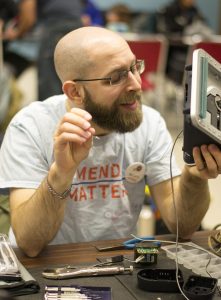
What kind of items do you fix?
Household electronics; stereos, appliances etc.
When did you first start volunteering with Repair Café Toronto?
May 2013, original fixer
Day Job
Software developer
Favourite Location
Toronto Reference Library
Quote
“Technically, food is never inside your body.”
Why did you start getting interested in repairing things?
My mother saw a poster for the first Repair Café. It sounded fun and I liked taking things apart. I’ve been volunteering ever since.
How did you learn your skills?
In high school I did math and science, and did engineering at university.
What does it mean to you to volunteer at Repair Café Toronto?
It’s a fun thing to do. I help people fix their things and they are very happy when I do.
What is the most memorable item you have fixed?
It’s hard to say. I see many of the same things over and over, maybe a DVD player and recorder. I opened it up and replaced all the components and he was so happy.
Why should people get involved with Repair Café Toronto?
You can save money, extend the life of your household items, help the environment and learn to fix things yourself. I brought some socks to fix once and now I can do them myself. It’s also a fun social environment.
Where do you see Repair Café Toronto in five years?
I imagine we might get so big we’ll need to have two. It’s really been growing the last four years. I hope it keeps growing. Repair Cafés all over the GTA are popping up and I hope to see more if there aren’t already. In five years I’m sure there will still be things breaking and in need of repair.
- Ken
What kind of items do you fix?
Mostly fine jewellery, chain repair, small decorative objects and eyeglasses but I have also replaced an enormous number of watch batteries!
When did you first start volunteering with Repair Café Toronto?
My first Repair Café was January 2016.
What is your day job?
I’m retired, formerly a professor in the Material Art & Design program at OCAD University.
What is your favourite location?
The Toronto Reference Library is my favourite. The jewellers are usually situated in front of the big windows so there is lots of light and space. We also get a lot of “regulars” coming to this location and the traffic is brisk. All the venues have their charms and I’ve seen the insides of some interesting libraries, churches and community centres that I wouldn’t otherwise have seen.Do you have a favourite quote?
“We don’t fix Cats, Cars or Broken Hearts.” National Ornamental Metal Museum, Memphis Tenn.Why did you start getting interested in repairing things?
I’ve been interested in these skills for a long time. I used to teach a jewellery repair class at George Brown College in the 1990s. As the owner of an old house I have learned all sorts of repair skills beyond fixing jewellery.
How did you learn your skills?
I was originally trained as a goldsmith and I had to learn how to repair jewellery for my own customers. If you are a maker, you have the skills to repair what you have made. I have learned a lot from videos on the internet, there is a repair video for almost everything. They have kept my used washing machine going for over a decade.
What does it mean to you to volunteer at Repair Café Toronto?
I really enjoy the social interaction between the fixers, volunteers and clients. As a teacher, I am interested in passing on useful skills, so having apprentice fixers is a satisfying aspect. I also appreciate having to “think on my feet” when presented with a repair problem. It often leads to inventive solutions and keeps my aging brain sharp.
What is the most memorable item you have fixed?
My 100+ year old house, the repair is ongoing.
Why should people get involved with Repair Café Toronto?
It’s a great opportunity to learn something, teach something, fix something or get something fixed, all in the company of some exceptionally skilled and charming individuals…with coffee and cake no less! A circular economy with snacks. What more could you ask for?
Where you see Repair Café Toronto in five years?
I see more chapters emerging, we started one at OCADU that is thriving and engaging our university community. I hope to see Repair Cafés pop up everywhere and become one of the necessities of life. The world needs repair.
- Ezra
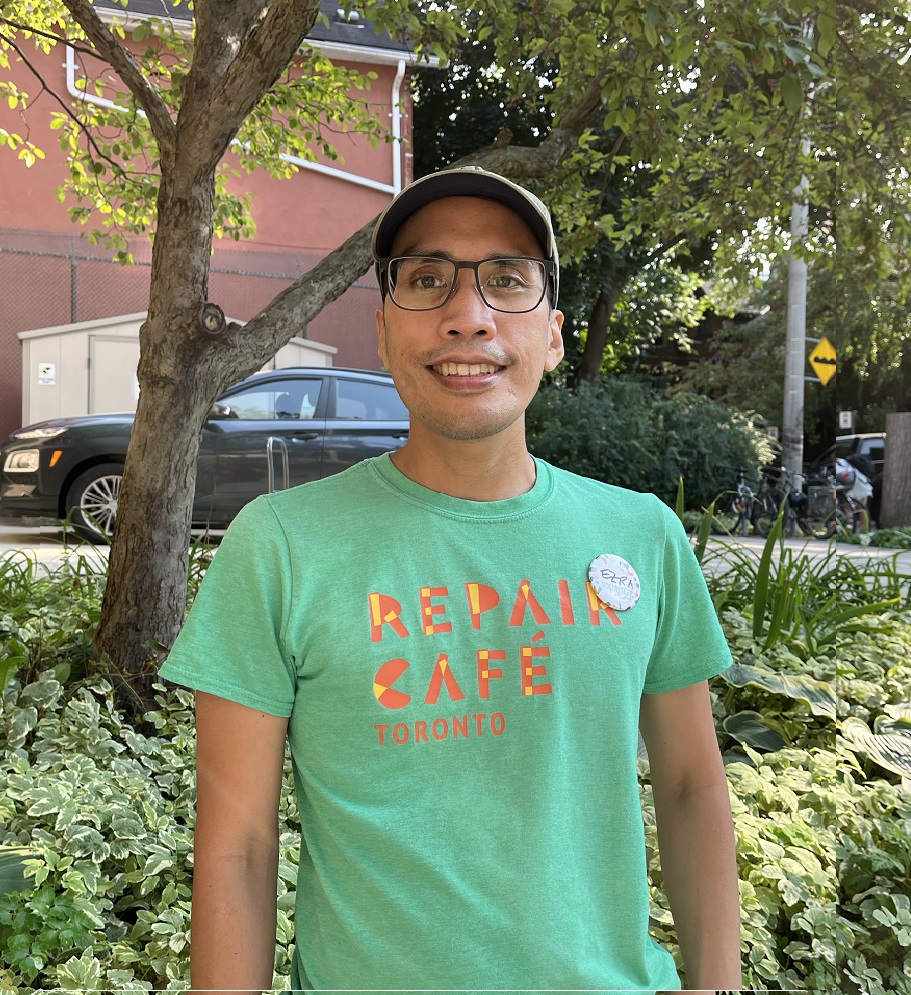 What kind of items do you fix?
What kind of items do you fix?
For the Repair Café, primarily bicycles but I’ll pitch in on electronics and household goods too. For myself, I do some sewing repairs and projects but I don’t have a sewing machine so it’s mostly hand sewing and darning for me.When did you first start volunteering with Repair Café Toronto?
2015. I was already going to Repair Cafés to get my things fixed but then I moved to the Jane and Finch area and it was harder for me to get to the monthly events so I thought about organizing one in my area. Through that, I met Paul, who told me about his work teaching tech and repair at PEACH, a program for at-risk youth. I also started volunteering there until the funding for the youth program ended.What is your day job?
I work at a clinical research company.What is your favourite location?
I liked the ones at Driftwood Community Centre because I could walk there (and also it’s the place where I first organized a Repair Café).Do you have a favourite quote?
I don’t know if it’s my favourite quote but I like Rainer Maria Rilke’s poem below:
Let everything happen to you
Beauty and terror
Just keep going
No feeling is finalWhy did you start getting interested in repairing things?
When I realized I was too poor to buy replacements for broken things. I also have an aversion to throwing away anything that can still be useful.How did you learn your skills?
I learned basic bike repair through a Build-A-Bike program run out of a TCHC building in my neighbourhood. Participants got to refurbish an abandoned bike for themselves (which was donated by the city’s Solid Waste division) in exchange for refurbishing a bike for a community member. I continued volunteering there until COVID made them stop their volunteer program. For other things, it’s a mix of YouTube videos and advice from Repair Café fixers. I used to volunteer at the Toronto Tool Library’s St. Clair location on Sundays – when there was a mini-Repair Café there – and I learned a lot from the fixers about tools and repairs.\What does it mean to you to volunteer at Repair Café Toronto?
Something interesting and useful to do on the weekends. I also get to meet a wide range of people and, unlike at a customer service job, the “customers” are usually pretty nice.What is the most memorable item you have fixed?
Somebody brought to the Sunday Repair Café a couple mugs that had gotten jammed together while moving. The owner hadn’t wrapped them and one mug had gotten stuck in another. My idea was to put ice inside the inner mug and to heat up the outer mug with a heat gun. The ice should have kept the inner mug cold and made it slightly contract while the outer mug should have expanded with the heat and given enough room to separate the two. My theory was proven correct and both mugs were saved. Oleg helped me with the extraction process.Why should people get involved with Repair Café Toronto?
Repair skills are useful to have, especially with the ever-increasing price of everything and the lack of growth in wages.Where do you see Repair Café Toronto in five years?
It’s hard to say. With luck and a lot of political will, all levels of government in Canada will take climate change seriously and will start funding a transformation to a green, circular economy. Every library will have a Library of Things and there will be regular repair cafés run by knowledgeable local volunteers. Without luck, repair skills will be even more useful in a Mad Max-style societal collapse. - Khadije
Watch Story of Two Knapsacks.
What kind of items do you fix?
I do all kind of alteration for clothing, bags, toys and even sometimes shoes.When did you first start volunteering with Repair Café Toronto?
I don’t exactly remember when but for sure more than 5 years ago.What is your day job?
Volunteering and teaching sewing at different organizations.What is your favourite location?
Reference Library is the most relaxing place, large space and friendly environment.Do you have a favourite quote?
Don’t toss your stuff as everything can be fixed or can be used for something else.Why did you start getting interested in repairing things?
My nature is to help people in any way and I was looking for a volunteering opportunity. Then I saw an advertisement on the newspaper about Repair Café and I contacted them. So here I am 5 years later.How did you learn your skills?
I got a course in sewing, but I learned the fine details from my mother. Since then I have been very interested in any kinds of work done by hand, such as quilting and embroidery. But what I like the most is alteration.What does it mean to you to volunteer at Repair Café Toronto?
A way to help the community. It gives me gratification especially when I see the happiness on someone’s face.What is the most memorable item you have fixed?
Changing and fixing a zipper in a different way and the visitor loved it. Also having a jacket mended so perfectly that you couldn’t even see the rip at all.Why should people get involved with Repair Café Toronto?
It is very nice to support each other in a caring environment, mostly in this difficult time during the pandemic.Where you see Repair Café Toronto in five years?
I am sure it will expand and hopefully it will come to my neighbourhood as well.

